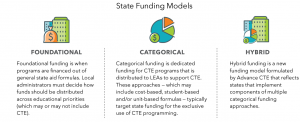This week lawmakers struggled to make progress on federal appropriations for the current fiscal year while the U.S. Department of Education (ED) announced new career-connected high school grants. Elsewhere, federal agencies formally unveiled a significant new regulatory proposal related to apprenticeships.
Congress Extends FY24 Funding for Another Month
 As shared last week, Congress passed an additional short-term extension of federal funding, known as a continuing resolution, which extends FY23 funding levels for federal programs through March 1 and March 8 later this year. The “laddered” CR is intended to provide lawmakers more time to negotiate full-year appropriations for federal fiscal year 2024 (FY24) which began last October. Of note for the Career Technical Education (CTE) community, funding for the Carl D. Perkins Career and Technical Education Act (Perkins V), which is included in the Labor-HHS-ED appropriations bill, is set to expire on the latter of these two dates in March.
As shared last week, Congress passed an additional short-term extension of federal funding, known as a continuing resolution, which extends FY23 funding levels for federal programs through March 1 and March 8 later this year. The “laddered” CR is intended to provide lawmakers more time to negotiate full-year appropriations for federal fiscal year 2024 (FY24) which began last October. Of note for the Career Technical Education (CTE) community, funding for the Carl D. Perkins Career and Technical Education Act (Perkins V), which is included in the Labor-HHS-ED appropriations bill, is set to expire on the latter of these two dates in March.
While this development is an encouraging step in the wider FY24 process, appropriations leaders must still establish individual allocations for each of the dozen bills that compose the federal budget. Known as 302(b) allocations, lawmakers have continued to struggle this week to successfully negotiate these funding levels including for the Labor-HHS-ED appropriations bill. Until 302(b)s are determined, lawmakers cannot move forward with negotiations on program-level funding, including for Perkins V’s basic state grant program and other important investments in education and workforce development. It remains unclear how lawmakers will come to a resolution on this important issue with current reports indicating that little progress has been made this week. As these efforts continue to take shape, Advance CTE will continue to advocate for robust funding for the foundational federal investment made by Perkins V.
U.S. Department of Education Announces Career-Connected High School Grants
Yesterday, U.S. Secretary of Education Miguel Cardona visited the Advanced Technical Center—an area career technical school located in Washington, DC and recently featured in the Washington Post for its impact on chronic student absenteeism in DC. During the visit, Secretary Cardona announced a slate of new grants as part of his agency’s career-connected high school initiative.
Advance CTE has previously highlighted that the activities authorized under this new discretionary grant program can already be funded using resources from Perkins V’s basic state grant program. In announcing 19 grant awards in total as part of this effort, which will benefit 17 states, the agency indicated that it received 160 applications for this funding totaling nearly $850 million. These applications for funding demonstrate significant unfilled demand for CTE programming which can only be addressed through a strengthened systemic investment via Perkins V’s state grant program. “The Biden-Harris Administration is going to keep on fighting to provide every student in every community with career-connected learning,” Cardona said as part of the announcement. More information on these grants can be found here.
DOL Moves Forward With Apprenticeship Regulations Impacting CTE
The U.S. Department of Labor (DOL) formally published a notice of proposed rulemaking (NPRM) last week which is intended to significantly update and overhaul the existing regulatory framework for registered apprenticeship programs. As shared previously, this NPRM also includes a new “CTE Apprenticeship” component with implications for state CTE agencies and systems. Yesterday, DOL hosted a webinar providing a high-level overview of this proposal. An archived webcast, including related presentation materials, can be accessed here. Comments on the NPRM are due March 18 and can be submitted through this comment portal.
Steve Voytek, Policy Advisor



 Lawmakers remained in home states and districts this week as part of Congress’ annual August recess. Congress is expected to return in the early part of September where it is widely expected that federal fiscal year 2024 (FY24) funding for the federal government will be the top priority. Recently, Democratic and Republican leaders have indicated the likely need to pass a short-term stopgap spending legislation, known as a continuing resolution (CR), to provide more time to negotiate full-year FY24 appropriations legislation for programs like the Carl D. Perkins Career and Technical Education Act (Perkins V*) and other related education and workforce development programs. In recent weeks, Advance CTE and the Association for Career and Technical Education (ACTE)
Lawmakers remained in home states and districts this week as part of Congress’ annual August recess. Congress is expected to return in the early part of September where it is widely expected that federal fiscal year 2024 (FY24) funding for the federal government will be the top priority. Recently, Democratic and Republican leaders have indicated the likely need to pass a short-term stopgap spending legislation, known as a continuing resolution (CR), to provide more time to negotiate full-year FY24 appropriations legislation for programs like the Carl D. Perkins Career and Technical Education Act (Perkins V*) and other related education and workforce development programs. In recent weeks, Advance CTE and the Association for Career and Technical Education (ACTE)  The 2022 school year heralded the start of another new initiative for the District of Columbia’s Office of the State Superintendent of Education (OSSE)- the
The 2022 school year heralded the start of another new initiative for the District of Columbia’s Office of the State Superintendent of Education (OSSE)- the  The Delaware Department of Education recently named Jon Wickert as its new Director, Career and Technical Education (CTE) and Science, Technology, Engineering, and Mathematics (STEM) Initiatives. His path to state CTE leadership reflects the power of career exploration and social capital that will sustain ‘The First State’s’ strong record of innovation and transformation of CTE systems.
The Delaware Department of Education recently named Jon Wickert as its new Director, Career and Technical Education (CTE) and Science, Technology, Engineering, and Mathematics (STEM) Initiatives. His path to state CTE leadership reflects the power of career exploration and social capital that will sustain ‘The First State’s’ strong record of innovation and transformation of CTE systems.